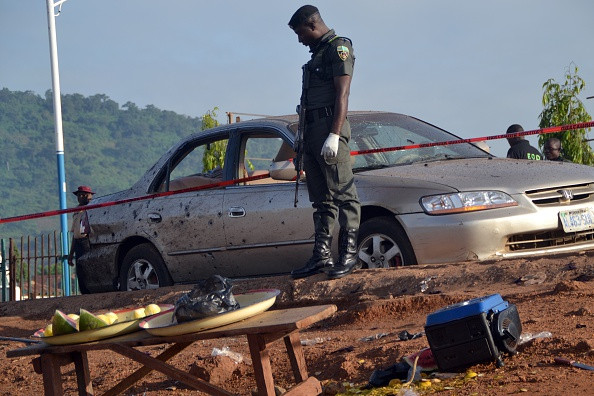Nigeria: Boko Haram releases new video reaffirming Isis alliance

Nigerian terror group Boko Haram has released a new video claiming it has not been affected by an ongoing regional offensive aimed at curbing terrorism. The footage shows an unidentified man reaffirming the allegiance with Islamic State (Isis) and its leader, Abu Bakr al-Baghdadi.
The man, who spoke in Hausa and in Arabic, denied the militants are surrendering to the Nigerian army, contrary to what the military had claimed. The militant also denied troops freed women and children kidnapped by the terrorists, known for abducting civilians and forcing them to carry out suicide bombings, according to the BBC.
According to David Otto, CEO of UK-based global security provider TGS Intelligence Consultants, Boko Haram timed the video to be published as the government's claims of successful anti-terrorism operations are increasing.
"This video will give confidence to its supporters and militants scattered around Nigeria and neighbouring states that the group is still alive and well and that the military pronouncements is propaganda only," he told IBTimes UK.
Nigeria's Boko Haram releases video with IS pledge and without leader Shekau - #BBCAfricaLive http://t.co/mUfyANXrWm pic.twitter.com/NpF0ySZBHQ
— BBC Africa (@BBCAfrica) October 7, 2015"The absence of [the group's leader, Abubakar] Shekau is equally significant. We cannot rule out the possibility that he is no longer alive, but the most crucial point is that Shakau wants the world to believe that the recent allegiance between Boko Haram and IS means that he is no longer the National Emir as before."
Otto also suggested that the fact the Boko Haram reiterated its allegiance to IS might mean the group is calling for its assistance. "The continuous paying of allegiance in recent videos may be a tactic to call for IS action rather than just verbal acceptance of allegiance by IS leaders," he said.
"At a time when the military is putting huge pressure on the stability of the sect and its militants captured in hundreds, reaffirming allegiance could be a call for help in arms, militants, finance or put simply, begging for IS intervention. This video should be seen as a sign of weakness of Boko Haram/Iswap and it is the right time for the military to keep their feet on the pursue pedal."
Who are Nigeria's Boko Haram terrorists?
Boko Haram (recently renamed Iswap) fights against Western influence in Nigeria and aims to impose its version of Sharia law in the country.
The group declared an Islamic caliphate in Gwoza, along the Cameroon border, in August 2014.
Boko Haram has raided several cities in the north of the country in a bid to take control of more territory.
Three states − Adamawa, Borno and Yobe − have been under a state of emergency since May 2013, due to Boko Haram's attacks.
Nigeria is leading a new task force against Boko Haram – consisting of 8,700 troops from Nigeria, Niger, Chad, Cameroon and Benin – which is believed to have scored some successes, such as the recapture of a key town in Borno.
In September, the Nigerian government alleged Boko Haram was surrendering, while the group said in an audio message that claims made by government and army are false.
The person heard speaking in the audio is believed to be Shekau, who is rumoured to have been replaced due to his repeated absence from the group's videos. In August, Chad's President Idriss Deby alleged Mahamat Daoud had replaced Shekau as the leader of Boko Haram. Shortly after, Shekau released an audio message denying the claim.
Some analysts have also alleged that since the group pledged allegiance to IS, Shekau has stepped aside as Boko Haram now takes orders from IS leaders.
Nigeria up close: Check out our Flipboard magazine
© Copyright IBTimes 2025. All rights reserved.




















